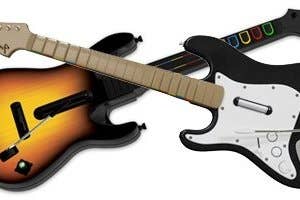Can the guitar games market be resurrected?
Guitar Hero co-creator Charles Huang and analysts weigh in on the likely relaunches of the Guitar Hero and Rock Band franchises
Odds are either you or someone you know still has plastic guitars in a closet somewhere. In the first decade of this century, Guitar Hero and Rock Band were nigh unstoppable, as casual and hardcore players alike snatched up tons of fake guitars and drum sets while hosting music game parties. Combined with the casual accessibility and popularity of the Wii, it was the perfect storm for the industry as sales soared to new heights. By the end of the decade, however, the guitar games market started dropping off precipitously. There was a glut of titles, hardware and precious little innovation beyond the (albeit great) initial concept. By 2010, when Rock Band 3 shipped, Harmonix wasn't seeing the results it wanted and started concentrating more on the newest fad, dance games, leveraging Kinect for Dance Central. Soon after, Activision decided to put Guitar Hero on hiatus as well.
Now, halfway through this next decade, very strong rumors are swirling that one, if not both, of these franchises will soon see a return. But will players care? And more importantly, can the market support the genre (and associated peripherals) all over again? GamesIndustry.biz spoke to Charles Huang, co-creator on the original Guitar Hero, as well as some analysts to get their take.
"I don't see the Guitar Hero/Rock Band music genre coming back strong," said independent analyst Billy Pidgeon. "Success is possible, but expectations should be low, as while these games will sell again, the sales volume will be much smaller. Value-pricing the hardware and software would help, and it might also help if last generation peripherals were supported for gameplay on current generation systems."
Indeed, expectations should be kept in check. It's important to remember, that the guitar genre at its peak accounted for about 10 percent of the entire console games market, Huang noted. "Music is still a viable genre (e.g. Just Dance), just not the global multi-billion dollar genre it was from 2007-2009," he said.
"The high price point of a big peripheral bundle might be challenging. Casual gamers have a lot of free-to-play options"
Charles Huang
Wedbush analyst Michael Pachter agreed: "It was a $2 billion market in 2008, so probably a $200 million market now. The games are old enough that they might be ready for a re-fresh, and I would imagine there is room for both to succeed if they don't oversaturate the way they did last time."
So, clearly no one's anticipating a massive market for these games again, but EEDAR's Patrick Walker does believe there's enough demand currently to support a decent level of sales for the new games.
"There is definitely an opportunity for a revival of the music genre considering the strong sales of the next generation consoles, the relative health of the overall economy compared to when the music genre initially faded, the broad appeal of the genre, and the marketing and IP power of the companies in the space," he said.
"In addition, while the music genre suffered from an over-saturation of releases in the latter half of the last console generation, enough time has now passed that there is likely pent-up demand for a new peripheral release from fans of the genre who have moved on to next generation systems. Of course, it will be very difficult replicate the previous breakout success because of the 'novelty effect' that drove the genre's success when it first entered the market. But that doesn't mean that there isn't room for one or two major franchises to have success with consistent, periodic releases."
Huang foresees some challenges ahead, however, should Harmonix and Activision both pursue a revival of the guitar games.
"There is some headwind for console music games in 2015. First, the music genre attracts a more casual and female audience versus other genres. But the casual gamer has moved from console to mobile," he warned. "Second, the high price point of a big peripheral bundle might be challenging. Casual gamers have a lot of free-to-play options. Skylanders' success points the way for a low unit price peripheral based games model that scales. I'm proud that Guitar Hero brought a lot of non-gamers into gaming. I think it'd be great to see music games come back to the forefront and do that again."
One positive indicator of interest is that some of the older Rock Band and Guitar Hero peripherals are still selling, even today. IDC research manager Lewis Ward found that, as of the middle of last year, more than 12 percent of gamers said that someone in the household had bought a new/used guitar controller in the past year (from July 2013-June 2014). "I suspect that these types of games are brought out at parties and family gatherings a couple times a year and enjoyed many years after release," Ward commented. "That's another way of saying that music games appears to have a fairly long shelf life - they're a bit like Nintendo's evergreen titles if that makes sense."

